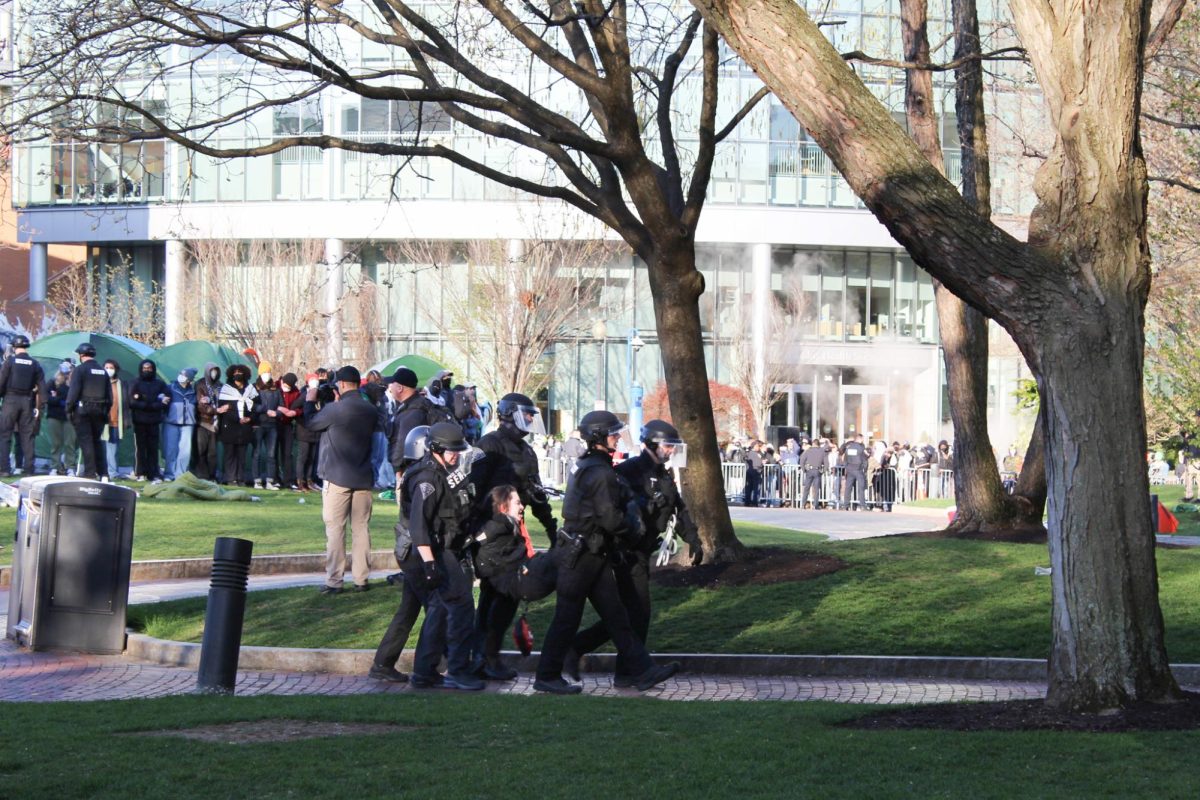By Nick Dyess, News Correspondent
In a culture consumed by spoiler alerts, “Captain Phillips” is somewhat of an anomaly.
Most who will go to see “Captain Phillips” already know how director Paul Greengrass’ based-on-a-true-story thriller is going to end. It is a testament to Tom Hanks’ expert performance and Greengrass’ directing skill that already knowing the ending doesn’t ruin the story, or alleviate any of the tension at all.
On a routine cargo transportation voyage in 2009, Maersk Shipping Captain Richard Phillips (Tom Hanks) sees a band of Somali pirates rapidly approaching his ship. Phillips delays their boarding as long as possible, but the pirates eventually climb onto the ship.
Due to quick thinking by Phillips and his crew, the pirates are unable to accomplish their original plan of hijacking the ship and bringing it back to their homeland. Instead, they kidnap Hanks, forcing him into a small, encapsulated lifeboat.
The US Navy quickly pursues and a very tense cat-and-mouse game begins — if the lifeboat makes it back to Somalia, Phillips will be held for ransom, with no guarantee of his survival.
The last 30 minutes of “Captain Phillips” feature some of the most expertly paced, shot and acted scenes that will be released this year. The tension is unyielding as the Navy SEALs slowly close in on the increasingly desperate pirates and their hostage. By the end of the film’s 134-minute run time, the audience will want the ordeal to be over just as much as Captain Phillips does.
This is all possible because of Hanks’ brilliant performance. Hanks initially plays his character with a sense of cool confidence — he is concerned, but not rattled when the pirates board his ship. He knows that he must remain in control of himself for his crew to survive. Even when he is forced into the lifeboat and realizes that he is now a ransom chip, Phillips remains calm.
However, as the pirates begin to become more unhinged as they run low on supplies and hope for survival, the audience is unable to tell if Phillips is beginning to unravel as well.
After being threatened repeatedly with execution, it becomes unclear whether or not Captain Phillips is really that confident, or if it is all an act — at first for his crew, and now for himself. Is his escape attempt from the lifeboat a desperate improvised gambit, or a well thought-out plan? It isn’t revealed until the very end just how much the events have affected Captain Phillips.
Throughout the movie, Hanks is contrasted with self-appointed pirate leader Abduwali Muse. Muse is played by first-time actor Barkhad Abdi, who excels—first as a determined hijacker, later as a creepy kidnapper and finally as a desperate underdog clinging to hopes of freedom as the juggernaut US Navy closes in.
Like Captain Phillips, Muse is putting on an act as well. “Everything going to be alright,” Muse repeats throughout the film, always with the same self-assured tone. When he is telling his pirate crew to calm down as they initially board the ship, everyone believes him. With the might of the US Navy bearing down upon him, it is unclear whether Muse even believes it himself.
The ‘shakycam’ that Greengrass made famous in the “Bourne” series is frequently used in “Captain Phillips” as well. It will turn some off, and sometimes the technique obfuscates the action needlessly. However, its extreme effectiveness in creating anxiety and dread in the cramped confines of the lifeboat far outweighs any problems it causes.
The hostage situation ultimately ends not with a bang, but with a thud. It has an air of inevitability about it — of course Captain Phillips was going to be freed. The pirates never had a chance. A lesser movie would have ended on that note, with a blunt reminder of US superiority. But Greengrass and screenwriter Billy Ray bravely choose to make the climax of the movie about the emotional aftermath of the incident, with Hanks crying, wildly gasping for air as he goes into shock.
Captain Phillips is free from his captors, but it will take much longer to escape the psychological and emotional damage done. These are the most powerful scenes in the movie, and Hanks’ powerful performance in them will rightfully earn him an Oscar nomination. When the screen faded to black, the audience left quietly, not talking about how cool the rescue of Captain Phillips was, but instead ruminating on how he will recover.













